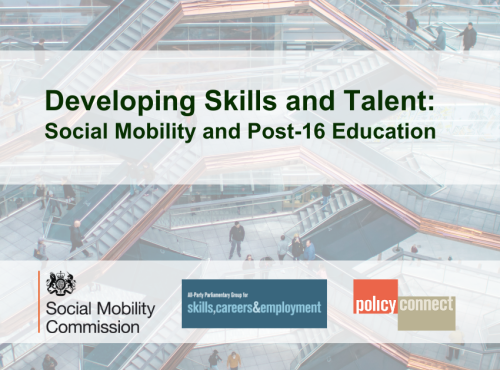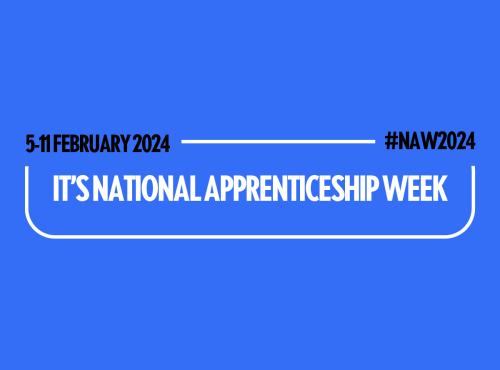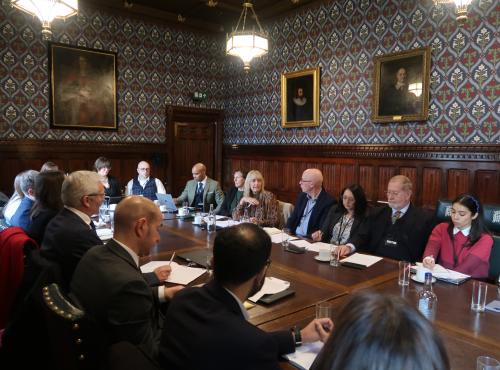Higher Technical Qualifications: How to liberate employers and skill workers for the future
Maximise the potential of Higher Technical Qualifications to skill Britain for success in the 21st century economy, says the latest report by the Skills Commission.
Whilst the ‘skills agenda’ has recently attracted significant policy attention, skills shortages remain prevalent in the green and high-tech industries set to dominate the British economy in coming decades.
Cross-party think tank Policy Connect’s report, ‘Higher Technical Qualifications: How to Liberate Employers & Skill Workers for the Future’, co-chaired by Sir John Hayes MP, Baroness Sue Garden of Frognal, and Graham Hasting-Evans, CEO of NOCN Group, sets out how maximising the potential of higher technical qualifications (HTQs) can produce a workforce skilled to flourish in the 21st century economy.
The inquiry was carried out by the Skills Commission, in partnership with The Centre for Education & Youth. Sector-specific roundtables outlined the barriers hampering HTQ uptake, with stakeholders recommending policy solutions centred on empowering employer choice and facilitating coordination.
Amidst significant economic change, demand is growing for skills that are adapted to an increasingly automated economy. Whilst increased uptake of HTQs may plug skills gaps, enrolment in HTQs declined by 63% between 2009-10 and 2016-17. With a third of current jobs set to be affected by automation, those occupying lower-level roles will also need opportunities to reskill into higher technical roles.
Despite their importance to plugging England’s current and forthcoming skills gaps, this report highlights low levels of engagement with HTQs. Lack of awareness and financial disincentives have hampered employer-led demand, with lack of flexibility and uncertainty about employment also barriers to learners. Even where there is demand for HTQs, providers are often discouraged by financial constraints.
The Skills Commission report establishes an evidence-based course for a skilled, talent pipeline ready to excel in the jobs of the future. It sets out practical measures to improve the uptake and prestige of HTQs, recommending that:
-
The Government should follow a phased approach that gradually develops recognition of the value of HTQs.
-
Employers should be given greater ease and ability to spend the Apprenticeship Levy.
-
Enhanced local collaboration can enable flexible, modular HTQs that serve both companies and training providers.
-
Modularised qualifications should be accredited to enable mid-career upskilling and reskilling through HTQs.
During the inquiry, government officials were briefed on emerging findings, and we are pleased to see that one of our recommendations has already been accepted in part. Last month, government published its Lifelong Learning Entitlement, which includes HTQs.
Inquiry Co-Chair, Sir John Hayes MP
“As the former Minister of State for Further Education, Skills and Lifelong Learning, I recognise the pressing need to skill and re-skill our workforce to meet the challenge of rapid economic change. It is clear that higher technical education is arguably the most efficient, accessible and ethical way of increasing the supply of needed skilled workers. This report charts an evidence-based course for Britain’s workers to flourish in the 21st century economy, armed with the technical abilities derived from HTQs. Now, realising this vision will depend on the drive and collaboration of policymakers and stakeholders across the skills landscape.”
Report co-author, Baz Ramaiah, Head of Policy, Centre for Education & Youth
"The Centre for Education and Youth are delighted to have supported Policy Connect with researching and writing this report on the timely and vital issue of Higher Technical Qualifications. Ensuring young people have the skills to allow them to thrive in a greener, more automated economy is vital and Higher Technical Qualifications will play a vital role in that upskilling and reskilling process. Our research highlights barriers to current uptake and engagement with these qualifications and models how policy change could remove some of these barriers and improve the visibility and attractiveness of Higher Technical Qualifications."
Dr Peter Wilson, Senior Researcher, Policy Connect
“The recent policy attention devoted to the ‘skills agenda’ has highlighted the urgent need to appropriately skill, upskill, and re-skill Britain’s workforce. Higher technical education will have a critical role in to play in the transition to a more automated industrial economy. Yet, there remain significant barriers to improving the uptake of Higher Technical Qualifications. The Skills Commission have developed findings that seek to deliver upon the demands of employers for a workforce equipped with HTQ-enabled skills ready to excel in the jobs of the future. We are confident that implementing the report’s recommendations will expand the relevance, accessibility, and utilisation of HTQs.”
Notes to Editors
For further information, please contact Victoria.Zeybrandt [at] policyconnect.org.uk (Victoria[dot]Zeybrandt[at]policyconnect[dot]org[dot]uk)
This inquiry has been sponsored by NOCN Group, Jisc, and Kent Further Education.
About Policy Connect
Policy Connect is a cross-party think tank. We specialise in supporting parliamentary groups, forums and commissions, delivering impactful policy research and event programmes and bringing together parliamentarians and government in collaboration with academia, business and civil society to help shape public policy in Westminster and Whitehall, so as to improve people’s lives.
Our work focusses on five key policy areas which are: Education & Skills; Industry, Technology & Innovation; Sustainability; Health; and Assistive & Accessible Technology.
We are a social enterprise and are funded by a combination of regular annual membership subscriptions and time-limited sponsorships. We are proud to be a Disability Confident and London Living Wage employer, and a member of Social Enterprise UK.
About the Skills Commission
Policy Connect's Education and Skills team run the Skills Commission. The Commission brings together parliamentarians, leading figures from across the FE and skills sector, academics, and employers to undertake high-level research into Further Education and Skills policy, making recommendations to government, the sector, and industries.
About the Centre for Education & Youth
The Centre for Education and Youth (CfEY) is a 'think and action-tank'. We believe society should ensure all children and young people receive the support they need to make a fulfilling transition to adulthood.
We work with a wide range of organisations, and people who share this belief, helping them make wise, bold decisions about how best to support young people.
We use our timely and rigorous research to get under the skin of key issues in education and youth, aiming to shape debate, inform policy and change practice. Set up as a community interest company, we have a particular interest in issues affecting marginalised young people.



